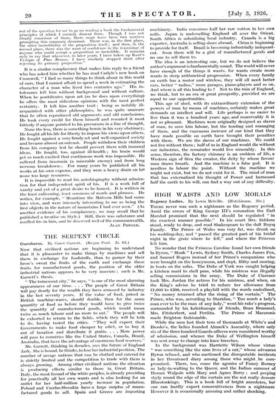THE SERPENT CIRCLE
Ouroboros. By Caret Garrett. (Kegan Paul. 2s. Gd.)
Now that civilized nations are beginning to understand that it is pleasanter to make things by machines and sell them in exchange for foodstuffs, than to garner by their brow's sweat the fruits of the earth and exchange these fruits for manufactured goods, the position of the older industrial nations appears to be very insecure : such is Mr. Garrett's thesis.
"The tumescent city," he says," is one of the most alarming appearances of our time. . . . The people of Great Britain will pay. dearly for the wealth they have amassed by industry, in the last seventy years. If the value of food, priced in British machine-wares, should double, then for the same, quantity of food as before they would have to give twice the quantity of manufactured goods, which would mean twice as much labour and no more to eat." The people will be exhorted to return to the fields, which they will be loth to do, having tasted the cities. "They will expect their Governments to make food cheaper by edict, or to buy it out of taxation and distribute it gratis. . . . More power_ will pass to countries like the United States, Canada, Brazil, Australia, that have the advantage of enormous food reserves."
Mr. Garrett, thinking in decades, sees the future of England dark. She is bound, he thinks, to lose her industrial position. The number of savage nations that can be clothed and catered for is strictly limited and the competition to trade with them is. alwaysgrowing. Among other civilized nations the situation. is producing effects similar to those in Great Britain. Italy, the most fecund of the white peoples, is already providing for practically all her own wants and is also looking for an outlet for her half-million yearly increase- in popnlation. Poland and ezecho-Slovakia have a large -surplus of manti, factured goods to sell. Spain and Greece are importing
machinery. India consumes half her raw cotton in her own mills. Japan is underselling England all over the Orient. South Africa is subsidizing local industry. Canada is a big exporter, Australia is selling shoes abroad. China, is beginning to provide for itself. Brazil is becoming industrially independ- ent. Soon there will be a glut of manufactured goods and no one to sell them to.
The idea is an interesting one, but we do not believe the author's argument is fundamentally sound. The world will never have enough of the things it wants, for wants create more wants in steep arithmetical progression. When every family on earth has a motor and wireless, they will all need better cars, better radios," more garages, piano-players and so on. And where is all this leading to ? Not to the ruin of England, we think, but to an era ot great prosperity, provided we are . equal to our opportunities.
This age of steel, with its extraordinary extension of the powers of man by means of machines, certainly makes great demands on intellect and will. Life perhaps is no easier to live than it was a hundred years ago, and conceivably it is not so pleasant. Machines were originally designed as slaves of man, to save him labour, but the tending and managing of them, and the enormous increase ,of our kind that they have made possible on earth have brought their penalties with them. We are the slaves of our machines. We could not live without them ; half of us in England would die without our industries, the remainder would live miserably. In this sense, therefore, the factory chimney is an emblem of life, a Western sign of Siva the creator, the deity by whose favour man draws breath. And the machine is a false god. It is needless to labour the point. Without the machine we might not exist, but we do not exist for it. The mind of man that has externalized his thought of Power and harnessed half the earth to his will, can find a way out of any difficulty.










































 Previous page
Previous page